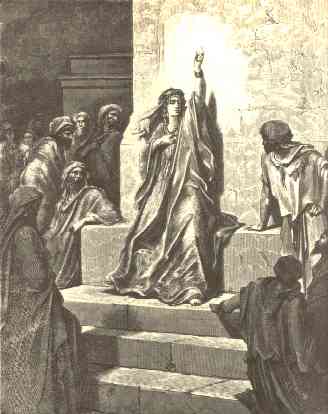Mighty warrior and Mother of Israel: 3 things Christians can learn from Deborah
Deborah – a biblical prophetess who spent her days instructing Israel from under a palm tree – lived in a tumultuos period of Israel's history. Her story is recorded in Judges 4-5.

In a time where Israelites were living under Canaanite rule, Deborah was one of the four judges of Israel, the only female one recorded in the Bible. The people of Israel were oppressed by Jabin, the king of Canaan, and had been for 20 years.
In a time where there was no King, the judges ruled Israel. They were considered prophets and by consulting God, through prayer and meditation, they would give counsel and settle disputes in Israel.
Motivated by the suffering she saw, Deborah acted, stirring up a rebellion. She sends a military commander called Barak to gather 10,000 troops ready to attack the Canaanite military leader Sisera. He says he will not go, if she doesn't come with him. So she obliges.
The battle is victorious, and peace comes upon the land for 40 years (Judges 5:31).
Deborah's story is a remarkable one. She lived a life that any man in her 12th Century patriarchal society would have envied. This is not a comment of the limitations of women, rather on the sovereignty of God. No man would have chosen a woman to judge Israel, but God did.
What can we learn from this woman of God?
1. God won't abide by our rules.
Deborah's rise to prominence would have subverted the structures in which she lived. Women in ancient Israel held a subordinate position in society, and that she was appointed judge – a ruler of Israel – would have gone against all the rules of her society.
Yet, God did it any way.
Where man is bound by convention, God is free. It is easy for us to look around at our circumstance and be limited by it, inadvertently making it sovereign. We allow our situation to dictate our actions, making them the authority, relegating God's authority.
The life of Deborah is a reminder that God is sovereign. Rather than looking to our situation – or societal norms – to dictate the value or direction of our lives, we get to look to God. We are free to live to another standard.
2. Submit to him
Deborah's life, though not dictated by societal norms, remained one of radical submission – just to a different authority.
Rather than relying on her own wisdom, Deborah consistently referred back to the words of the Lord. Her first words to Barak were "Has not the Lord, the God of Israel, commanded you..."
The invitation away from society's expectations to God's does not lead to our autonomy and control, but to a radical submission. It is only in her yielding to God, that Deborah is useful to God.
Similarly, it is only through allowing God to work through us, that we are able to be raised up and become useful to Him. Deborah was not elevated to the position of Judge through her own abilities, but through God's sovereign choice, and her willingness to be obedient.
Where other judges fell through pride, she did not. Rather than owning the victories as her own, she and Barak sang a song glorifying God for His victory.
3. He will enable and embolden us
Deborah spoke boldly in tough situations, spoke God's truth in times of uncertainty and commanded an army into battle, facing the enemy they had been suppressed by for 20 years. Her courage became an encouragement, enabling Barak – with Deborah by his side – to go to battle. This led to victory – driving Sisera into the tent of Jael, who killed him in his sleep.
Her faith in God led to her being emboldened to act, as she trusted that He would deliver Israel against her enemies.
In this position of submission, God will guide our lives in a way – whilst not always looking like worldly success – enabling us to do things that, in our own strength we would not be capable of.
Deborah, the Mother of Israel, submitted to God, liberating her from the shackles of her society in order that she might liberate her nation from theirs.











